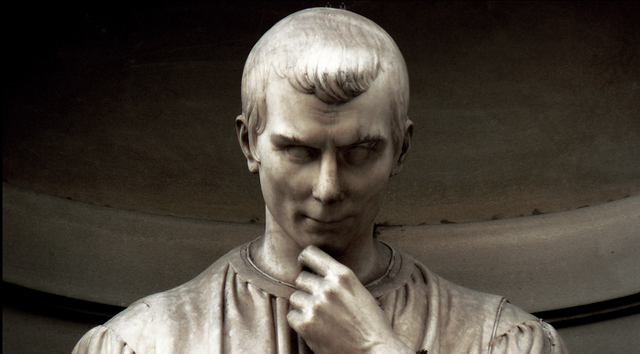About the technology of power of Machiavelli and the contractual state theory of Hobbes
Machiavelli develops politics as an experimental science - a science based on the study of experience.
At the heart of political behavior for Machiavelli is the interest / benefit / power. According to Machiavelli, the basic and most important principles of political science are:
- Human abilities create history;
2.Interests and passions can change in appearance, but not the law of history; - While some peoples are advancing and others are falling, the contributions of all are preserved.
Machiavelli replaces the medieval understanding of the divine predestination with the idea of the relationship between the objective historical necessity he calls fortuna and the active role in the historical process of the free will of the individual. Machiavelli justifies the idea of the secular nation-state, and believes that the theocracy (the religious state), the empire and the city-state have no creative potential, have no future. Machiavelli introduces one of the key concepts of politics - state . Machiavelli adheres to the authors who set six types of government. Three of them: monarchy, aristocracy, and democracy, are right, but they are so easily tampered with that they become dangerous: the monarchy evolves into tyranny, the aristocracy - in the oligarchy , and democracy - in anarchy. The political ideal of Machiavelli is the Roman Republic in the period after the establishment of the written Roman laws and the institution of the national tribunals.
In "The Master" Machiavelli sets out the idea of political success, he formulates the principles and rules of political technique as a science tool for success in politics: 1) There are two ways of political struggle that are intertwined: "one through laws, the other with the power" 2) In order to strike among the enemy, the ruler must unite in himself the qualities of a lion and a fox. 3) The ruler should strive to consider him virtuous, merciful, honest, caring, generous and not cruel, mischievous, malicious, 4) "The ruler must to imply fear in their subjects, but in such a way that if they do not win their love, at least to avoid their hatred. "5) You must protect yourself from being hated by your subjects because no strongholds can help if it is lacking their approval and consent, 6) the mind of a ruler is judged above all by his advisers, 7) there is no other means of protecting yourself from flattering but: giving people to understand that they will not offend you if they tell you the truth , 8) For the deeds of every man and most of all for the deeds of the ruler is judged by the success. In "The Master", Machiavelli reflects on the rules of politics not through the prism of justice and morality. This gives grounds to Machiavelli's critics to introduce the term "machiavelism" - in the sense of immorality in politics.
Hobbes - Contractual State Theory
His work "Leviathan or Matter, Form and Power of the Church and the State of Civilization" is considered to be the first systematic account of the new liberal-political ideas. Underpinning his political views, Hobbes sets the principles of human reason. Hobbes develops innovative ideas about the emergence and functions of the state. He criticizes the thesis of her divine origin with the help of a still quite primitive and not very mature version of "contract theory. While people exist without a common power to respect them, they are in a state of "war for everyone." Hobbes develops the idea that the state is a voluntary consent of people to give up certain rights and freedoms of their natural state by conveying them to a supreme state authority that expresses and defends common ideas. The fact that the people themselves, on the basis of a reasonable agreement, create the state itself is already a challenge to its time. Here are more important aspects: 1) It should be noted that in their natural state people are in a "war for everyone against each other" and are guided by the maxim "man for man is a wolf" 2) In order to avoiding the state of eternal war, Hobbes demanding a strong state power, 3) negotiating people for the creation of a state in the political philosophy of Hobbes is based on one's own will and reason; 4) after reasonable agreement on the establishment of the state a major factor in the further development becomes state power - the will and understanding of the state the jealous sovereign. Hobbes is one of the first political thinkers to raise the issue of the rights and freedoms of state subjects. In an effort to justify a strong and indivisible power, Hobbes often overwhelms the opposing ideas of a monopolistic and indissolubly total state. He first distinguishes the basic law from other laws and thus sets the beginning of constitutional law.

To listen to the audio version of this article click on the play image.

Brought to you by @tts. If you find it useful please consider upvoting this reply.
Thank you for that :)
They are both great thinkers of their times. As I see Machiavelli approached the problem of state from a king point of view and Hobbes approached it from commoners point of view. The rights and freedoms of state subjects is still the key idea of all rights fighters on any agenda.
Both stone-cold realists, accepting that politics is "dirty" by nature, a truth many dishonest people try to hide.